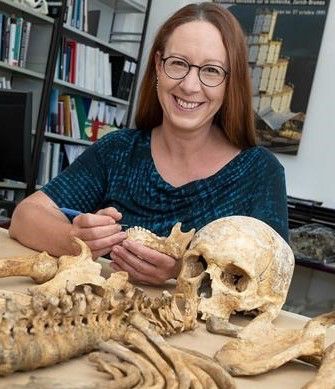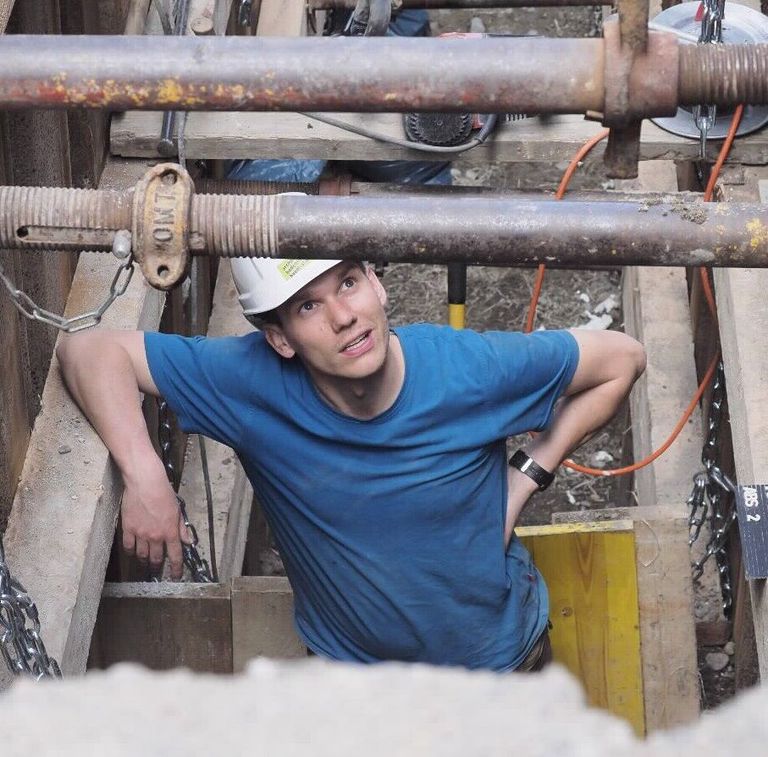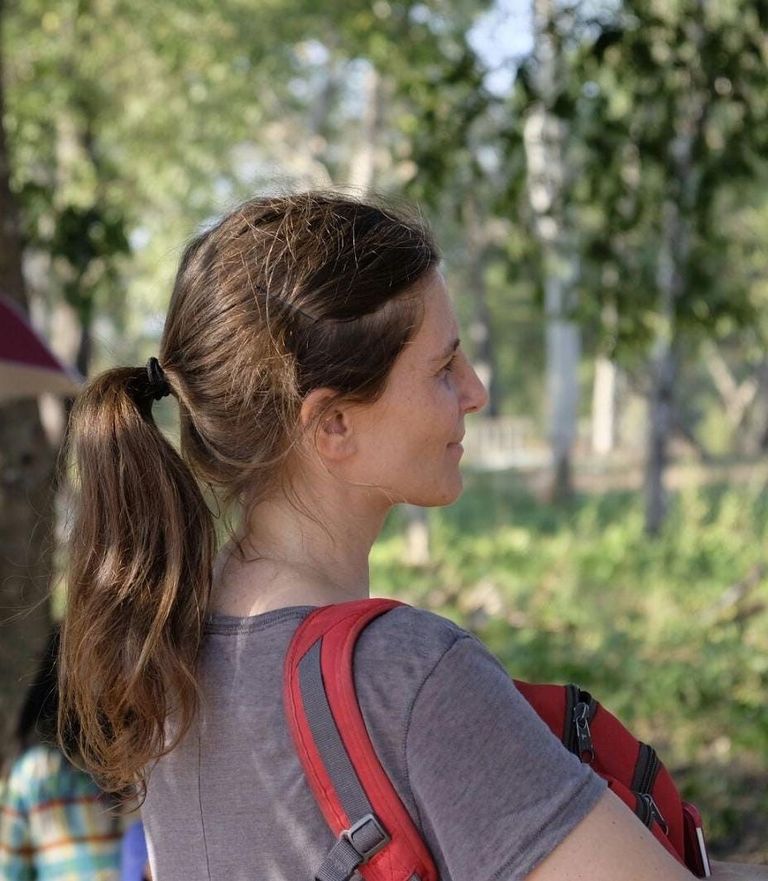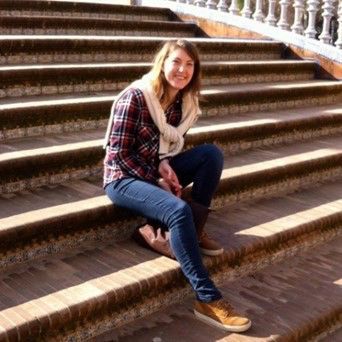Board
The Committee is elected for three years. The last elections will took place in 2021.

President
Sandra Lösch
Sandra studied biology with a major in physical anthropology and human genetics at Ludwig-Maximilians-Universität München (LMU) in Germany. She received her PhD in 2009 from the Institute of Forensic Medicine at LMU with a thesis on a medieval skeletal collective from alpine Bavaria. She has been head of the Anthropology Department at the Institute of Forensic Medicine since 2010 and habilitated at the Medical Faculty of the University of Bern in 2019. Her team processes human remains on excavations and in the laboratory, and supervise cantonal and international excavations. She also leads scientific projects and teaches at the Faculty of Medicine, the Faculty of Philosophy and History and the Faculty of Law. She supervises students on master and doctoral level at the University of Bern and acts as a reviewer for theses of international universities, for peer-review journals, as well as for international research funding bodies.
Main research interests: forensics, bioarchaeology, nutrition, mobility, paleopathology, prehistory and early history, life in ancient Egypt
https://orcid.org/0000-0003-3442-9764

Vice-president
Christine Cooper
Christine studied physical anthropology in Zürich. Both her master’s (2003) and doctoral research (2010, Johannes Gutenberg University, Mainz) focused on trauma in victims of medieval and post-medieval battles. From 2004 to 2010 she was a research assistant at the University of Bern (Anthropology Workgroup, Institute of Medical History). Since 2010 she is employed as an anthropologist at the Archaeology Department/Office of Culture of the Principality of Liechtenstein as well as at the University of Bern (Anthropology Department, Institute of Forensic Medicine).
Main research interests: palaeopathology, osteoarchaeology, funerary practices, prehistoric to post-medieval populations
https://orcid.org/0000-0001-7904-808X

Secretary
David Roth
David studied prehistoric and archaeological sciences as well as Prehistory and Early History at the University of Basel. He completed his Master's degree in Archaeoanthropology in 2019. In his master's thesis, he investigated taphonomic changes and perimortem violence on Neolithic skeletons from the El Trocs cave in the Pyrenees. Since 2020, he has been working at the Archäologische Bodenforschung Basel-Stadt as an anthropologist and technical supervisor. He is currently supervising the excavation in Freie Strasse. Additionally, he also works at the Natural History Museum Basel. The practical application of physical anthropology during excavations and the workflow between anthropology and archaeology are important to him.
Main areas of research: Physical anthropology, traumatology, workflow and the interdisciplinary connection between archaeology and anthropology

Treasurer
Jocelyne Desideri
Jocelyne studied prehistoric archaeology and specialized in bioanthropology in the Biology section at the University of Geneva. Her research has always evolved within interdisciplinary projects dealing mainly with the past population lifestyles and peopling dynamics through a bioanthropological perspective. Within her academic career, she quickly specialized in dental anthropology for both her master's thesis (2001) and her doctoral research (2007). She has progressively integrated new methodologies into her research. Thus, after training in aDNA analysis at the aDNA Laboratory of Lakehead University (Canada), Jocelyne completed a postdoctoral fellowship between 2008 and 2009 in the Archaeological Chemistry Laboratory at the University of Madison (US). Currently, she is lecturer and scientific assistant at the University of Geneva. Since 2013, her main mission is to develop research in bioanthropology, in particular by training the next generation of students (bachelor, master and PhD). In addition to the teaching of bioanthropology, she conducts two field-schools (Albania and Bulgaria) each year to familiarize students with funerary archaeology.
Main research interests: bioanthropology, dental anthropology, isotope geochemistry, peopling dynamics, mobility, lifestyles, paleodiet, prehistoric and historical periods, funerary archaeology, Europe, Africa
https://orcid.org/0000-0003-1372-7420

Chief Editor
Claudine Abegg
Claudine completed a Masters in forensic archaeology and anthropology at the University of Cranfield (UK). After that, she pursued a PhD on the state of health of neolithic populations of Western Switzerland, looking at all paleopathological lesions in available necropolises in the area, which she successfully defended in 2019.
She went on the be a forensic anthropologist at the University Centre of Legal Medicine Lausanne-Geneva until 2023. Since 2024 onwards, she has been working on Prof. Marie Besse’s SNSF project on craftspeople during the Bell Beaker period around the Mont-Blanc. In parallel, as an independent anthropologist, she has been mandated by the Vaud canton to carry out anthropological analysis in the context of planned fieldwork or provenance studies.
Research interests: paleopathology, osteological collection management, ethics in physical anthropology, neolithic studies

Webmaster
Timea Remsey
Timea studied Prehistoric and Medieval Archaeology at the University of Zürich and then completed a Master's degree in Bioarchaeology at Durham University. In her Master's thesis, she analysed pre- and postnatal isotope signals in deciduous teeth in combination with palaeopathological findings in order to draw conclusions about maternal and early childhood health.
Since 2021, she has been working as an anthropologist and project manager at the Kantonsarchäologie Zürich, where she has led the project on the Zürich Hospital Cemetery. Since 2025, she has also been working for the Kantonsarchäologie Schaffhausen and is the anthropological director of the large-scale excavation of a former leprosarium.
Research interests: palaeopathology, stable isotopes, Developmental Origins of Health and Disease (DOHaD), medieval and modern hospital history